Unsung heroes make Health Sciences labs work
Keeping research labs staffed, stocked and on target means these managers, technicians and coordinators create a path for scientific innovation.
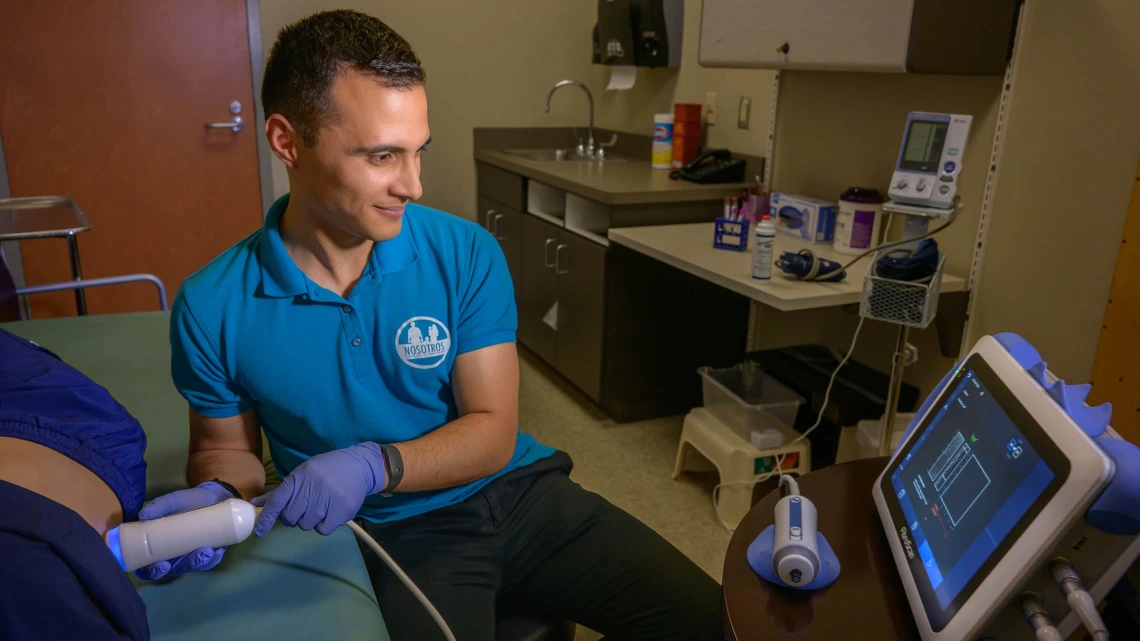
Edgar A. Villavicencio does a FibroScan test on a Nosotros Comprometidos a Su Salud (Committed to Your Health) study participant.
For academic and scientific research to happen, University of Arizona Health Sciences labs might consider co-opting the phrase “It takes a village to raise a child” to “It takes a village to run a lab.” But that “village” likely doesn’t happen without lab managers, research technicians and coordinators – the people who all play a vital role in the smooth operation of a lab and the success of a project, often working behind the scenes.
Wearing many hats and serving the community
For David O. Garcia, PhD, FACSM, a University of Arizona Mel and Enid Zuckerman College of Public Health associate professor of health promotion sciences, his lab needs Edgar A. Villavicencio. “Without a doubt, our research coordinator Edgar” is essential, Garcia said. “He has had such a wonderful impact on the community and our college.”
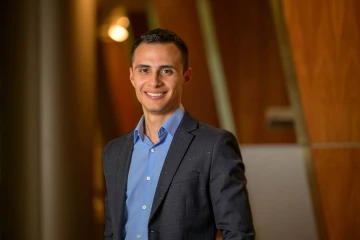
Edgar A. Villavicencio is the research coordinator for Nosotros Comprometidos a Su Salud (Committed to Your Health).
Villavicencio began working with Garcia as a research assistant in 2018 and joined the Nosotros Comprometidos a Su Salud (Committed to Your Health) team as staff in 2020.
The Nosotros program’s mission is to reduce health disparities faced by Mexican-origin communities and other Hispanic communities in Southern Arizona. “The work of the Nosotros team is centered around taking steps to develop a collaborative care model for liver disease that improves health equity, particularly for those who are under resourced,” Garcia said.
As a research coordinator, Villavicencio wears many hats. He oversees the team’s active research studies and coordinates the approximately 20-person team which includes full-time staff, PhD, master’s and undergraduate students doing internships and volunteer work. He ensures team members are collecting and managing data from study participants correctly, following IRB regulations and are HIPAA compliant. He also assists with coordinating community outreach events typically in Tucson, Nogales, Douglas and Yuma and assists with clinical visits where a FibroScan test is done to see how much fat and scarring there is on a study participant’s liver. Villavicencio said these tests can typically cost up to $300, but Nosotros does them for free and provides compensation to study participants.
“Recently, I've been more engaged in manuscript development, like writing papers, getting published, attending conferences and presenting abstracts,” he said.
Originally from Mexico, Villavicencio’s family moved to San Luis, Arizona, when he was 14 years old. “It was a huge change for me. I didn't speak any English at all,” he said. He obtained an associate degree in science at Arizona Western College in Yuma then transferred to UArizona where he completed both a bachelor’s and master’s in public health. Garcia was his faculty mentor during his graduate studies.
Villavicencio said what he loves most about his role is being able to see projects through from beginning to end. “It is very rewarding and cool to see at the personal level how we helped people by scanning their liver or giving them their blood values, and how we are putting that evidence together into scientific papers,” he said. “We’re not only there for the data, we’re there to serve the community.”
“Edgar demonstrates exemplary leadership and interpersonal skills for the Nosotros team,” Garcia said. “His passion and effective communication and leadership skills contribute to the development of those around him, including myself. He also has been instrumental in grounding our work in trust and community relevance. Edgar is directly responsible for the success of Nosotros.”
Finding happiness at the bench
Taben Hale, PhD, a professor in the Department of Basic Medical Sciences and director of Women in Medicine and Science at the UArizona College of Medicine – Phoenix, did not hesitate in recommending research technician, Dana Floyd, as her lab’s superstar.
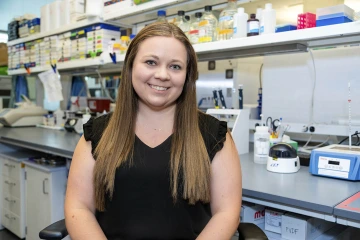
Dana Floyd is a research technician in Taben Hale’s, PhD, lab at the College of Medicine – Phoenix.
Floyd joined the Hale Lab in May 2019.
“The project that I work on has to do with fibrosis, hypertension and heart failure,” Floyd said. “We focus on the cells of the heart, the cardiac fibroblasts, because those are responsible for remodeling and helping repair the tissue after injury. While it is normal for these cells to repair and lay down scar tissue after an injury, for example, it has been found that sometimes they become over activated, but we don’t know why. Instead of helping a patient recover, this could lead to further issues. We’re
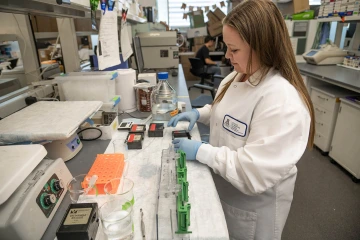
The Hale Lab’s current project is on fibrosis, hypertension and heart failure, which Floyd is working on.
“I rely heavily on Dana’s organization skills – not just to maintain order in the lab, but also to organize and plan complex experiments,” Hale said. “She has an incredible ability to juggle multiple experiments with a variety of endpoints and interventions. When she tells me when I can expect a result, she always delivers on time. Importantly, she is also incredibly careful and meticulous in her work.”
Floyd’s passion for her role as a research technician is unmistakable. “I just want to be at the bench doing experiments all day; that is my happy place.”
An unconventional path to the lab
Donna D. Zhang, PhD, the Musil Family Endowed Chair in Drug Discovery and professor of pharmacology and toxicology in the UArizona R. Ken Coit College of Pharmacy, is researching the physiological and pathological roles of Nrf2 in diseases induced by arsenic exposure. Her lab’s superstar is Wei-Tai Chen, a lab manager and research technician who is primarily involved in their arsenic-induced diabetes project. Chen works under the guidance of Matthew Dodson, PhD, an assistant research professor of pharmacology and toxicology, in the lab.

Wei-Tai Chen is a lab manager and research technician in Donna D. Zhang’s, PhD, lab.
After completing his master’s degree, Chen worked as a sales executive at Nanshan Insurance Company in Taiwan for two years. He moved to Arizona and joined the Zhang lab in June 2022. “My career path took a somewhat unconventional route compared to my academic background,” he said. “I sought opportunities here and returned to the field of pharmacology, which I was familiar with. Dr. Zhang’s remarkable research capabilities and her prominent role in her expertise, coupled with the lab’s extensive publications and abundant resources, attracted my attention.”
A typical day for Chen involves ensuring the lab is running smoothly, supply ordering, equipment maintenance, setting up experiments, checking in on them throughout the day and assisting lab mates when needed.
He said it took about a month to become familiar with his role and an additional month to develop a sense of comfort and confidence.
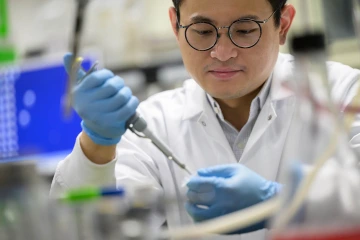
Chen is primarily involved in the Zhang Lab’s arsenic-induced diabetes project.
Dodson, who works closely with Chen, had high praise for his colleague: “Since joining our lab, Wei-Tai has grown immensely and is considered one of the most reliable members of the lab.”
In just over a year of working in the Zhang lab, Chen has picked up new skills and already contributed to research publications. “Scientifically, he has learned several new techniques, including complex mouse genotyping and breeding, as well as immunohistochemistry and immunofluorescence,” Dodson said. “His ability to generate consistent and reproducible results has been a great asset to our team. His efforts are evidenced by the fact that he already has two second author publications, one first author review, and a manuscript that he has contributed more than half the data for in just over a year. Overall, he has significantly enhanced the efficiency and scientific rigor of most of our lab projects.”

